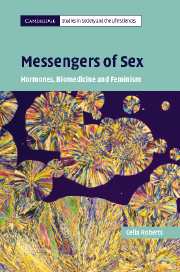Book contents
- Frontmatter
- Contents
- List of figures
- A message to readers
- Acknowledgements
- Introduction: feminism, bodies and biological sex
- Part I HORMONE HISTORIES
- Part II HORMONAL BODIES
- Part III HORMONE CULTURES
- 4 Elixirs of sex: hormone-replacement therapies and contemporary life
- 5 The messaging effects of HRT
- 6 Hormones in the world
- Conclusion: hormones as provocation
- References
- Index
6 - Hormones in the world
Published online by Cambridge University Press: 22 September 2009
- Frontmatter
- Contents
- List of figures
- A message to readers
- Acknowledgements
- Introduction: feminism, bodies and biological sex
- Part I HORMONE HISTORIES
- Part II HORMONAL BODIES
- Part III HORMONE CULTURES
- 4 Elixirs of sex: hormone-replacement therapies and contemporary life
- 5 The messaging effects of HRT
- 6 Hormones in the world
- Conclusion: hormones as provocation
- References
- Index
Summary
Nobody can be sure whether environmental estrogens lie behind the quadrupling of infertility rates since 1965; if the sea of estrogens in which we live explains the fact that sperm counts are half of what they were in 1940; and if, like intersex fish and mutant frogs, male humans might begin to morph into women. Faced with the possibility of an all-female planet, authorities might finally have to sidestep the pharmaceutical companies and take action.
(Seaman 2003: 222)Globally today, a group of chemicals in the air and in water, food and everyday household products, are suspected to be radically changing human and non-human bio-social systems. Known as environmental oestrogens or endocrine-disrupting chemicals, these substances behave like and/or disrupt endogenous sex hormones. Most of them are human-made products of the twentieth century, deriving from both banned and everyday substances: plastics and phthalates (chemicals used to make plastics flexible); pesticides such as DDT, dieldrin and chlordane; heavy metals like lead, cadmium and mercury; perfumes and musks; flame retardants; cleaning products; and industrial chemicals and by-products such as PCBs and dioxins. Endocrine disruptors exist in invisible, often infinitesimal, quantities – they can be active in parts per trillion (Solomon and Schetter 2000: 1474) – and are found in every part of the globe. According to reports from environmental non-governmental organisations like the World Wildlife Fund for Nature (WWF 1999: 3), ‘There is no clean, uncontaminated place anywhere on Earth and no creature untouched by this legacy.’
- Type
- Chapter
- Information
- Messengers of SexHormones, Biomedicine and Feminism, pp. 162 - 190Publisher: Cambridge University PressPrint publication year: 2007



